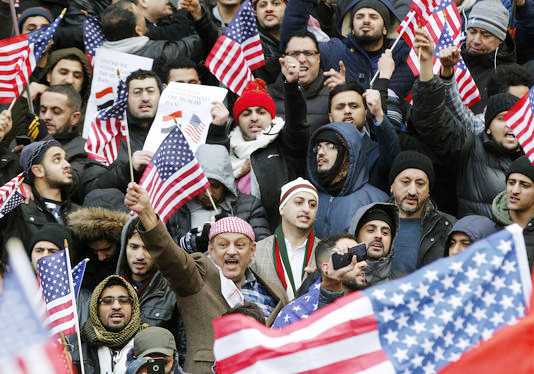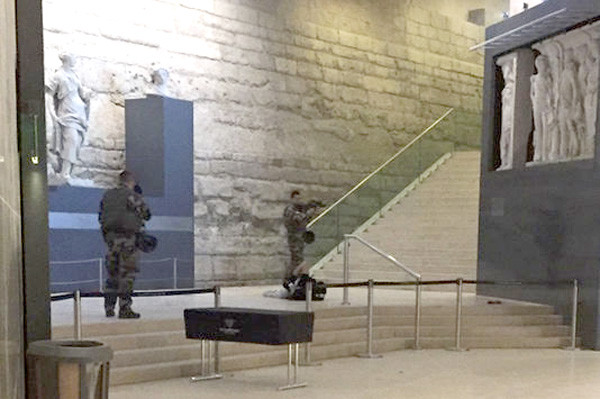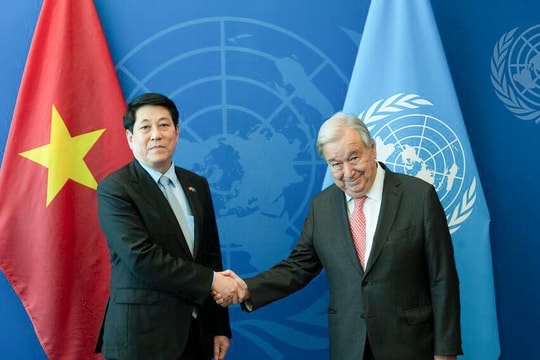The fear of extremist terrorism
(Baonghean) - Extremist terrorism is being pushed back on many fronts, but its specter still haunts and significantly affects the decisions of many countries, especially in the current sensitive world context.
 |
| People protest against the immigration ban in New York on February 2. Photo: AP |
America "shrinks" with immigration ban
On February 3, US judge James Robart of Washington state temporarily blocked the immigration ban that President Donald Trump signed on January 27, which prohibits people from seven Muslim countries from coming to the US.
The order aims to temporarily block immigration to the US for people from Iran, Iraq, Libya, Somalia, Sudan, Yemen and permanently for Syrians – countries considered to have many dangerous extremist elements.
Trump’s decision has sparked protests in the US. There have been protests and chaos as arrests have taken place at airports across the country. Most recently, the New York Museum of Modern Art (MoMA) has shown its disapproval by displaying works by artists from Sudan, Iran and Iraq.
Not only domestically, the international community also condemned this decree and said that these were discriminatory measures against Muslims while the White House firmly denied it.
Judge James Robart believes the executive order specifically targeting Muslim citizens violates the US Constitution's prohibition on discrimination. The White House immediately expressed frustration with the judge's decision.
In its initial statement, the White House said the ruling was “scandalous” before removing the word about seven minutes later, while also assuring the Justice Department would act quickly to defend a “correct and appropriate” decision.
The White House explained that the order was issued to ensure the safety of American citizens from the extremist threat when terrorists arrive under the guise of immigrants. However, this argument seems to be unconvincing when the latest attacks in the US were carried out by people not related to the countries on the banned list. Some analysts believe that the White House's decision will only further fuel extremist groups' narrative that the US is waging a war against Islam.
And a few hours before Judge James Robart's decision, CNN released a survey in which the majority of respondents (53%) opposed the immigration ban, with 55% of people saying such a ban would be tantamount to a Muslim ban.
At present, it is impossible to predict the fate of the immigration ban that Mr. Trump issued when Judge James Robart's ruling is only temporary. However, it is easy to predict that this decree will face a lot of opposition from within and outside the country, as it will not only impact American society but also increase chaos globally.
And perhaps it is also true as French Foreign Minister Jean Marc Ayrault expressed his opinion on President Trump's immigration ban that: "When faced with an unstable and uncertain world, trying to shrink back is a futile reaction."
 |
| Two soldiers guard a man lying on the ground after a knife attack in the Carroussel shopping center at the Louvre Museum on February 3. Photo: AP |
France is worried about counter-terrorism
France has not yet escaped the "ghost" of recent terrorist attacks, but on the morning of February 3, a knife attack occurred at the Carroussel shopping center at the Louvre Museum in Paris.
At around 10am, an unidentified man approached four soldiers at the entrance of the shopping centre. He was wearing a black T-shirt with a skull on it and was carrying a backpack. He attacked a French soldier with a knife. He shouted “Allahu Akbar” (God is greatest) before attacking the soldiers and was shot dead.
According to initial information from the investigation, the perpetrator is a 29-year-old Egyptian resident of Dubai. Anti-terrorism prosecutors have opened an investigation for “intentional murder in connection with a terrorist organization” in the incident.
Security forces searched the suspect but found no guns, explosives or identification documents. Notably, he was not on the French intelligence watch list. According to what investigators found on his Facebook and Twitter accounts, the suspect had a work permit in Dubai, was a football fan and was married.
He arrived in France on January 26 after applying for a visa from the United Arab Emirates (UAE) and planned to leave France on February 5. He rented an apartment in the 8th district for 1,700 euros for a week and bought two knives in a shop in the 11th district for 680 euros on January 28, just two days after arriving in Paris.
His Twitter activity spiked in the 24 hours before the crime. About an hour before the crime, he posted messages like “Why are they afraid of the emergence of the Islamic State (IS)?”, “IS protects the territory and honor of Muslims”, “They fight in the name of God and are not afraid” at least 10 times…
As for the last Twitter line in Arabia, if he is the author of it, it seems to be an announcement of the upcoming plan with the messages "No compromise", "No going back", "No peace in war" and a status line in confusing English "You are not Donald Trump and more... from now on your official name is: Donald Duck".
French investigators and prosecutors are clarifying the suspect's motive and are being very cautious in drawing conclusions because in less than 3 months France will officially hold the 2017 presidential election.
Many people do not rule out the possibility that the attack was carried out by lone extremist Islamic militants to weaken and attack the economy and punish their actions against the Islamic state. Regardless of the final investigation results, the security issue is still the biggest challenge facing France at this time, especially before the presidential election.
Chu Thanh


.jpg)





